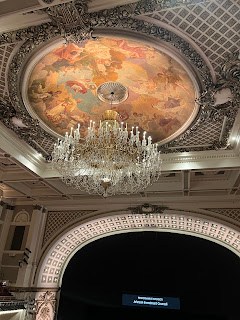By Margaret S. Hamilton
With
favorite melodies like “Yesterday” and “Hey, Jude” running through my head, I
ordered tickets for the Cincinnati Opera stage production of Paul McCartney’s Liverpool
Oratorio. McCartney wrote the oratorio—a large scale orchestral and choral
work with no costumes, scenery, or action—for the one hundred-fiftieth
anniversary of the Liverpool Philharmonic Orchestra. It was performed in
Liverpool Cathedral in 1991 and later performed throughout the world.
In
2022, the Cincinnati Opera started to organize the first opera performance of Liverpool
Oratorio—with soloists, chorus, orchestra, costumes, staged with
sets—as part of the 2024 Cincinnati Opera’s Summer Festival. Artistic Director Evans
Mirageas traveled to Liverpool with the opera set and lighting designers to
plan the production. With the four soloists, six members of the Cincinnati
Ballet, eighteen members of the Cincinnati Boychoir, and forty-plus members of
the Cincinnati Opera chorus, it was a packed stage. The Cincinnati Symphony
Orchestra, in full “Verdi” mode with lots of brass, performed in the orchestra
pit beneath the stage.
McCartney
collaborated with TV, film, and ballet composer Carl Davis to orchestrate his oratorio.
The work is comprised of eight movements from the life of Shanty, born in 1942
Liverpool during the German bombings. It is an autobiographical piece,
mirroring McCartney’s own childhood and teenage years in Liverpool. He pays
homage to his grammar school teacher, Miss Inkley, the only female teacher in a
school with a thousand male students: “As the lone female in this
establishment, you may call me ‘Sir’.”
The
orchestral music was lush and full-bodied. The aria lyrics and melodies were
pleasant, evoking many Beatles songs. The solo singers were excellent, veterans
of the international opera stage. The ballet dancers seamlessly integrated
their choreography into the musical numbers. And not to forget the eighteen
members of the Cincinnati Boychoir, running around the stage in their schoolboy
blazers, shorts, and knee socks, who stole the show.
The
Cincinnati Opera is actively engaged in making opera performances accessible to
the local community, with recitals and outdoor performances in public venues,
including the zoo. By staging McCartney’s oratorio, it has moved summer opera
in a new direction, appealing to a wider audience.
Readers
and writers, have you attended an opera production?






What fun, Margaret. While we lived in Cincinnati, we attended a variety of events in Music Hall -- all before the surrounding area underwent a major revitalization.
ReplyDeleteAt one point in my callow youth, I dated a classical violinist, and we went to performances, both where he played & that he wanted to hear, and did get to an opera or two. He maintained that opera had been designed "for the people." I have to admit that much of it went over my head, and I related much better to the music produced by another fellow I dated, who was a horn player with Buddy Guy's blues band. But I fear I don't really appreciate music the way most people do.
ReplyDeleteAlthough I have attended various opera events, this one sounds like one I would definitely enjoy. My tastes tend to run to Pops vs. the true symphony and opera presentations and this seems like a perfect blend.
ReplyDeleteOh, I’m jealous. I’ve heard about this oratorio, but have never seen it.
ReplyDeleteMy dad was a huge opera fan and when I turned five he took me to see the Magic Flute at the Metropolitan Opera House in NYC. Attending the opera with Dad became an annual tradition, eventually at the Metropolitan Opera House in Lincoln Center. College, marriage, and life got in the way for a while. When I attended my first opera in Miami in the mid 1980s, I was shocked to discover they used supratitles. It does make the opera more accessible, but gee, read the libretto!
I've often wondered about this oratorio - thanks for the review!
ReplyDeleteMy aunt took me and my sister to the opera when we were young - elementary school. She and friends had season tickets and if a friend couldn't go, one of us would fill the seat. (Orchestra fourth row!) For me (a ballet fan), the music was secondary - I fell in love with all the stage craft and the passion of the opera fans. I still remember vividly the appearance of a very young Placido Domingo in his Hartford debut - the crowd went wild.